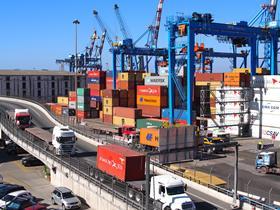
Food will be left to rot in ports unless a frictionless border is maintained between Europe and Britain, according to the British Retail Consortium (BRC).
In a letter written to Prime Minister Theresa May, chief executive of the BRC Helen Dickinson said it was “time for a reality check” on the consequences of failing to reach a border deal come March 2019, when Britain leaves the EU.
Co-authored with Richard Pennycook, chairman of the British Retail Consortium, their letter warned of fresh produce being “left rotting in ports, reducing the choice and quality of what is available to consumers”.
The retail group provided figures estimating that more than 12,500 small retail businesses will be at high risk of going bust in the event of no deal.
In 2016, 3.6 million containers from the European Union passed through UK ports, just under 10,000 per day, delivering 50,000 tonnes of food to UK consumers.
Under a no-deal scenario, the BRC suggest that food and beverage products would face an average increase in the cost of importing from the EU of up to 29 per cent from non-tariff barriers.
Richard Pennycook commented: “We must avoid a cliff edge scenario on the 29 March 2019 at all costs. Failure to achieve a smooth transition will create a lose-lose scenario for UK consumers and EU producers. Our food supply chain is complex, highly organised and ultimately fragile.
“Frictionless trade is essential if the industry is to continue to provide the level of choice and value in shops that UK consumers are used to seeing. It is now of the utmost importance that the UK Government proposes a workable solution to the backstop that gets the Withdrawal Agreement over the line and allows for a smooth transition. We need the EU to be flexible and creative in negotiation and recognise what is at stake for exports to the UK. Time is running out.”
Last month the government announced it has a “backstop” customs plan in place that will come into effect if no-deal is reached by March 2019.
The fresh produce sector has repeatedly called for frictionless borders to continue, with estimates that a further two minutes spent on incoming goods could create 30 mile lorry tailbacks in France.
A reversion to World Trade Organisation trade rules should no deal be reached, would see international tariffs applied to imported goods, raising the cost of fresh produce among many other products.



